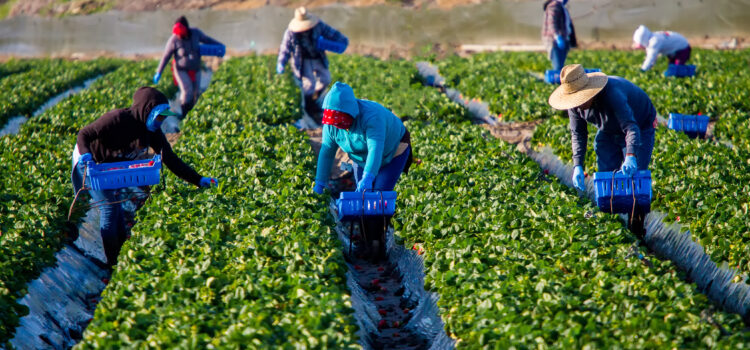
Agricultural workers have an elevated vulnerability for contracting COVID-19, according to a statewide survey on farmworkers’ worksite conditions during the pandemic.
The current pandemic has worsened existing vulnerabilities farmworkers for a number of reasons. The COVID-19 Farmworker Study (COFS) shows, as a result of the pandemic, that farmworkers have experienced a dramatic loss of work and income; lack healthcare access and experience fear using medical services; are vigilant about virus prevention practices outside of the workplace; report low numbers of employers providing face coverings; and are excluded from important safety-net programs.
Together, six organizations — Líderes Campesinas, Central California Environmental Justice Network, Alianza Ecologista, Farmworker Care Coalition/Vista Community Clinic, Comite Cívico del Valle and the Centro Binacional para el Desarollo Indígena — interviewed nearly 900 farmworkers from 21 counties across California.
Based on survey respondents, 46 percent reported decreased farm work time and subsequent income losses during the pandemic. Nayamin Martinez, the executive director of the Central California Environmental Justice Network, said this is a result of increased competition for work. Prior to the pandemic, many workers held other jobs that have since halted, forcing them to return to the fields for an income.
“Many people not working in the fields previously are now working in the fields,” Martinez said.
One Tulare farmworker told Martinez prior to the pandemic, a normal crew size was 30 to 40 people. Now it’s more than 100 people working each day. Now, instead of working five to six 8-hour shifts a week, workers are working three 4-hour shifts a week.
“We were told by our employers we would have to wait to work because there are too many workers in one area,” said a Fresno County vineyard worker. “This was at the beginning of March through April, but now we are starting to work a few more hours.”
Of the survey responses, 54 percent reported costs, lack of insurance, or lack of sick leave as significant barriers that would prevent them from accessing health care even if they were ill.
An estimated 90 percent of California farmworkers were born in Mexico and approximately 60 percent are unauthorized to work in the United States. This means the majority does not have access to health insurance.
Parola Ilescas, from the Farmworker Care Coalition in San Diego, says medical care is often too expensive for those who are eligible for coverage. California employs an estimated 800,000 farmworkers, and most work at seasonal jobs—rarely holding full-time, year-round work—and earn an average annual income of less than $18,000, according to the COFS.
“I don’t have insurance and it’s very expensive to get treatment or be hospitalized,” a Coachella Valley farmworker said in the study. “I don’t have a large amount of income and in case of death by coronavirus the costs would be larger. This is a scary situation.”
Low-income households have been associated with higher cases of COVID-19. Factors such as pre-existing health conditions, crowded living conditions, and exposure to air pollution, have been identified as risk factors that disproportionately affect low-income, disadvantaged populations, the study says.
And 24 percent of respondents mentioned fear as a reason for not seeking care. Many of those who responded attributed their fear to distrust of government agencies and mistrust of the healthcare system, the study says.
“I would be afraid to go to the hospital with my daughters because I could be blamed for neglect if I didn’t take them soon enough,” said a Kern County orchard worker. “Then, they would separate us and deport us.”
The survey results also show 90 percent of those who responded reported taking precautions to protect their families when they are home; however, family members are still contracting the virus. At Wasco’s Primex Farm, 99 workers have tested positive for coronavirus as well as 42 of their adult family members and 25 children, according to the UFW.
“I stopped working at the beginning of the pandemic for my daughters,” said a Tulare County field and packinghouse worker during an interview for the study. “They didn’t have anyone to take care of them and they didn’t have school. I decided to stay home until things calmed down a little. It scared me to go to work because I didn’t want my daughters to become infected. I’m returning to work out of necessity.”
Those surveyed reported only 54 percent of worksites provided face coverings. Fernando Serrano from Alianza Ecologista said when farmworkers get sick, they can easily be replaced.
“They feel their health isn’t taken into consideration,” he said during a press conference Tuesday. “This is a long-standing systemic problem.”
The interviewers in the study asked the farmworkers for suggestions for the issues presented above.
The workers called for their employers to provide expanded income and safety net support for farmworkers, regardless of documentation status; to expand health care access and coverage for farmworkers and other undocumented workers; to provide extensive, culturally-relevant training and education to agricultural employers, supervisors, farmworkers and trusted community-based organizations on workplace safety practices during COVID-19; to ease barriers for farmworker to report COVID-19 related complaints and simplify access to support services and to mandate reporting and timely public release of data on COVID-19 cases by occupation and industry by both employers and county public health officials; to strengthen Cal/OSHA enforcement and worksite auditing activities; to involve workers in the development and improvement of workplace COVID-19 safety plans; and to involve trusted community-based organizations in the design and impleention of expanded safety-net programs for farmworkers, indeigenious, and immigrant populations.
Farmworkers also suggested employers improve cleaning and hygiene practices, enforce compliance of COVID-19 guidelines, improve the workflow to maximize physical distancing at work, and prove PPE and COVID-19 information.
The researchers are still working on the second phase of the study, which will involve obtaining in-depth qualitative sets of interviews from the same geographic regions in California that the first phase of the study included.